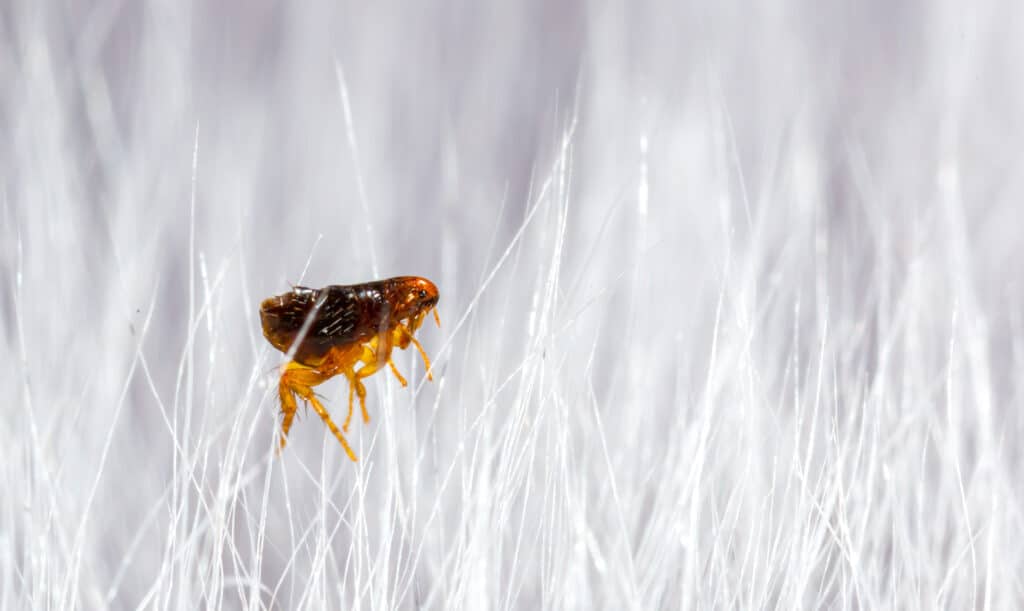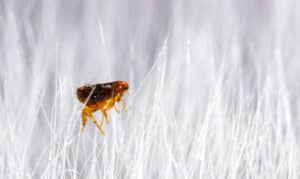

Flea Control in North Carolina and South Carolina
Understanding the Flea Life Cycle
Fleas are one of the most persistent and frustrating pests homeowners face in North and South Carolina. At Anticimex Carolinas, we understand how challenging it can be to manage these tiny, fast-reproducing pests—especially when infestations often go unnoticed until they’re already widespread. Whether you’re dealing with fleas inside your home or in your yard, early action and proper treatment are critical to protecting both your family and your pets.
Successful flea control starts with understanding how quickly fleas can multiply. Fleas lay their eggs directly on animals—usually our beloved cats and dogs—but those eggs don’t stay put. They fall off into carpets, pet bedding, and cracks in floors.
Female fleas can lay between 25-40 eggs per day, totaling up to 200 eggs during her short lifetime. Under ideal conditions—warm temperatures and high humidity—these eggs hatch within 2-5 days. Cooler, drier environments slow down their development.
Once hatched, larvae feed on organic debris, primarily “flea dirt,” which is the dried blood and feces left behind by adult fleas. Cat fleas, the most common culprit, pass through three larval stages over 7-14 days before forming cocoons. Inside these cocoons, they develop into adult fleas, usually emerging within 1-2 weeks when vibrations or the presence of a host signal that conditions are right.
Why Fleas Are a Health Concern
Fleas aren’t just a nuisance—they’re a serious public health risk. Fleas are known carriers of a number of diseases and parasites, including:
Keeping flea populations under control helps protect both your pets and your family from these health risks.
- Tapeworms (especially in dogs and cats)
- Murine typhus
- Cat-scratch disease
- Plague (in rare instances)
Keeping flea populations under control helps protect both your pets and your family from these health risks.

How To Get Rid of Fleas
1. Treat the Source: Your Pets
In most flea infestations, the family pet is the primary host. Consult your veterinarian or pet care professional to determine the best treatment for your pet. Options may include medicated shampoos, collars, spot-on treatments, or oral medications. Your vet can help you choose the safest and most effective solution.
It’s crucial to treat pets before attempting to eliminate fleas from the home. If untreated, pets will continue to introduce fleas into the environment.
2. Clean, Clean, Clean
Maintaining a rigorous cleaning routine is one of the most important parts of flea control.
• Vacuum floors daily, especially in areas where pets sleep or play. This helps remove eggs, larvae, and pupae while encouraging cocoons to hatch, making fleas more vulnerable to treatment.
• Dispose of vacuum bags or empty canisters outdoors to prevent reinfestation.
• Wash pet bedding and blankets regularly in hot water.
• Clean under furniture and along baseboards where flea dirt and eggs may accumulate.
3. DIY Traps and Flea Treatments
While professional pest control offers the most reliable solution, some homeowners can try temporary flea treatment measures to monitor flea populations:
• Dish soap and water traps placed near pet resting areas overnight can capture adult fleas.
• Some people report success with diatomaceous earth, salt, or baking soda sprinkled in affected areas, then vacuumed up after a few hours.
• Essential oils are sometimes used as natural repellents, but results vary, and care should be taken to ensure oils are pet-safe.
• Keep in mind: DIY methods alone won’t solve a serious infestation.
4. Address Wildlife Access
Sometimes flea infestations stem from animals like raccoons, squirrels, or stray cats nesting in attics, crawlspaces, or under decks. Ensuring your home is properly sealed against wildlife is essential for preventing fleas from gaining a foothold.
Why Professional Treatment is Often Necessary
There’s no one-size-fits-all solution when it comes to flea control. At Anticimex Carolinas, we offer comprehensive interior and exterior treatment plans tailored to your specific infestation and environment. Our trained technicians can assess your home, identify contributing factors, and recommend the best course of action for lasting results.
However, any pest control treatment will be ineffective if pets are not properly treated at the same time. Veterinary care must go hand-in-hand with any professional pest control program.
Ready to Take Action?
If fleas have become a persistent problem in your North or South Carolina home, Anticimex Carolinas is here to help. Contact us today for a customized flea pest control plan and let us restore your home’s comfort and peace of mind—because pests should never feel at home where you do
